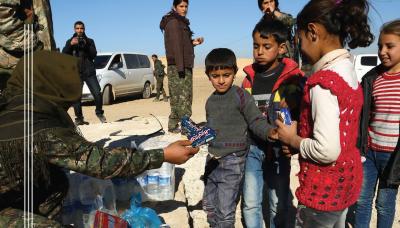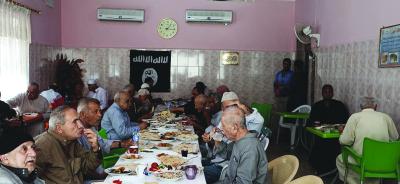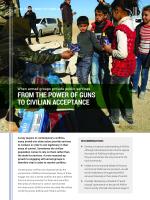From the power of guns to civilian acceptance

Contemporary conflicts are characterized by the involvement of different armed groups. Many of these engage not only in armed conflicts but also in different forms of service provision for those who live within their areas of influence or control. Some armed non-state actors (ANSAs) evolve into state-like entities combining social, political and military activities.
They are then no longer defined only by their military strength but also by their ability to provide services such as education, infrastructure, food and health care. For many ANSAs the development of governance mechanisms and service provision is not only a way of extracting economic gains from populations, but also an aspect of struggles over legitimacy, and even of a competitive state-making process. When the international community becomes involved during or after armed conflicts, it is important to understand that many people rely on ANSAs rather than recognized states for service provision.
■ Initiate a more nuanced debate of the pros and cons of ANSA service provision, as well as the implications of supporting ANSA services financially in their areas of control.
■ Consider developing a standard of “good enough” governance on the part of ANSAs that is worthy of broad international support.
In addition, most ANSAs that provide services possess a well-established resource base, control territory and/or population and act as de facto authorities. They may actually be colluding with state actors either secretly or openly, as it is often the case with militias, paramilitaries or mercenaries, in a sometimes symbiotic relationship. Moreover, state officials or state agencies can be directly or indirectly involved in the activities of ANSAs, sometimes for ideological reasons (such as secret support for rebels) and sometimes because of personal interests (such as political careers, corruption, clientelism, profit and family or clan ties). The lines between state and non-state are often blurred in such conflicts.
ANSA governance has a tendency to replicate the phases and approaches that lead to the formation of a state.
Most armed conflicts today involve ANSAs fighting governments’ armed forces or other ANSAs. In 2016 at least 36 non-international armed conflicts were taking place in twenty countries involving ANSAs. Such conflicts therefore remain a prevalent feature of the contemporary landscape.
Since the end of the Cold War, data collected by the Uppsala Conflict Data Program has identified Africa as the global epicenter of these conflicts, accounting for more than 75 percent of the global total between 1989 and 2015. ANSAs play a prominent role in most of these conflicts.
Building tolerance and securing control
The reason why ANSAs, such as Ansar al-Sharia (Libya) (see box 2), the Karen National Liberation Army (Myanmar), the former FARC (Colombia), Islamic
State (Iraq) and the People’s Defense Forces (Syria), decide to provide or intervene in the provision of services is their need to transform the “power of the guns” into benefits in the form of social control, economic gains and most of all civilian acceptance and cooperation. ANSA governance has a tendency to replicate the phases and approaches that lead to the formation of a state. As a humanitarian worker in Geneva expressed it:
“Insurgencies are won or lost on the parties’ ability to deliver services. In order to be the ‘exclusive’ service provider, the parties have to provide security as the first necessary service; hence the requirement to dominate by military means.”
3. allowing humanitarian organizations to freely operate
4. a combination of any or all the previous scenarios
In spite of ANSAs’ role in service provision, little evidence exists to measure its effects among civilians. However, in some countries like Somalia and Yemen, the evolving strategies of armed groups points to the fact that such social programs succeed in building tolerance among civilians, even for proscribed terrorist organizations like al-Qaeda.
Moreover, armed conflicts are increasingly being fought in urban areas. Several cities, including Aleppo, Fallujah, Maiduguri, Mosul, Sirte and Ta‘izz, have witnessed intense urban battles. Urban warfare entails a greater risk of civilian deaths, displacements and infrastructural damage. In many cases, ANSAs run urban systems such as water and power supplies in conjunction with civilian entities, thus reinforcing their key position in the provision of services.
Covering vital needs but increasing state fragility
International actors and donors tend to have a negative view of ANSA service provision since it increases the state’s fragility in situations where populations receive limited essential services from it. In such contexts, ANSAs perform core state functions. According to international actors, while such “informal” structures increase the coping capacities of the communities concerned, the diversity of service provision without integration into a larger state structure can make response and recovery in the aftermath of armed conflict more challenging. For donors like the OECD member states, the importance of ANSAs not only increases the immediate fragility of the community, it also erodes the authority and legitimacy of the state.

Education
According to the organization Protect Education in Insecurity and Conflict, approximately one-third of ANSAs worldwide provide education, and the percentage is higher for groups that control territory. In these cases, both states and ANSAs are the primary duty bearers. However, ensuring education as a positive obligation on the part of ANSAs might have the unintended consequence of legitimizing ANSA governance at the expense of the recognized sovereign state.
In Sudan, for instance, the Nuba Relief Rehabilitation and Development Organization, representing the Sudan People’s Liberation Movement-North, provides education to twenty thousand students. Several other ANSAs provide educational services, such as the People’s Protection Units in Syria and the Karen National Union in Myanmar. A key issue here is that the provision of education by ANSAs also givesthem privileged access to young people, who canbe ideologically and religiously indoctrinated and thereby mobilized.
When the international community becomes involved during or after armed conflicts, it is important to understand that many people rely on ANSAs rather than recognized states for service provision.
Health care
Groups as diverse as the FARC in Colombia, Hezbollah in Lebanon, the Liberation Tigers of Tamil Eelam in Sri Lanka, the Communist Party of Nepal-Maoist, the South Sudan People Liberation Movement in Opposition and the Karen National Liberation Army in Myanmar have each held territory and provided or facilitated health care. Islamic State granted access to vaccinators as part of a polio immunization campaign in areas they had forbidden other humanitarian organizations to enter.
ANSA involvement is extremely diverse when it comes to the provision of health care. Not all groups play the role of health-care providers or consider it an important activity. Numerous ANSAs obstruct humanitarian assistance and health provision, while many others provide them. A recent Chatham House study suggests that civil war, the demands of political and military survival, organizational formation, mobilization, levels of territorial control, state/ANSA co-operation and the demands of health-care beneficiaries are interconnected. This means that ANSAs’ strategic choices, together with the demands of the local community, are what determine which services will
be provided.
Ansar al-Sharia, in other words, enjoyed a number of “identities” as an ANSA, being a service, security and religious provider, as well as a proscribed terrorist organization.
DIIS Experts



